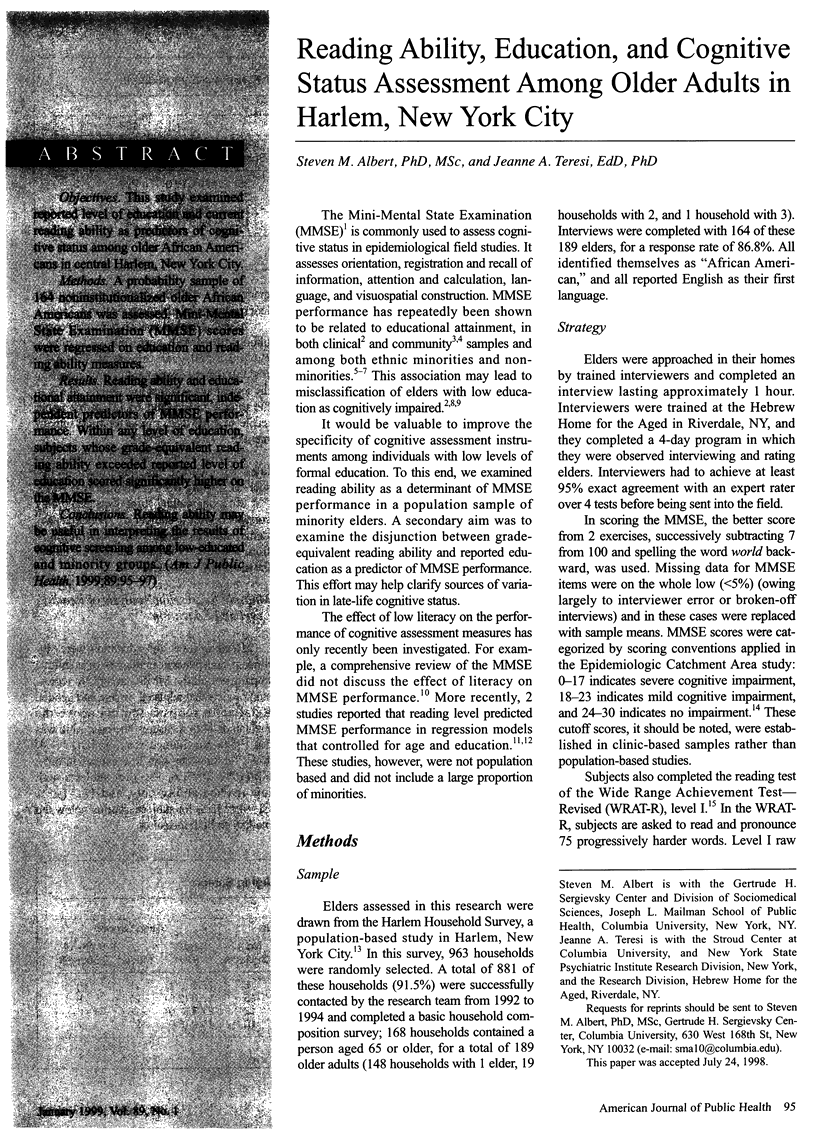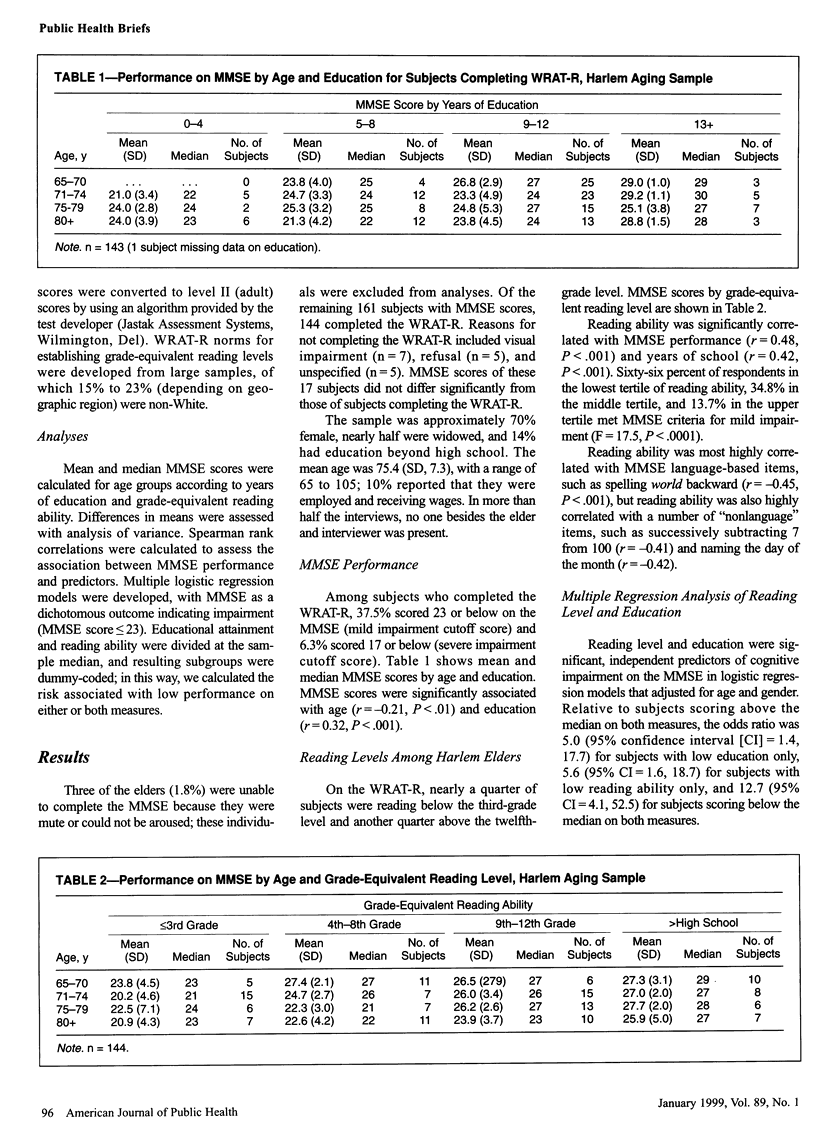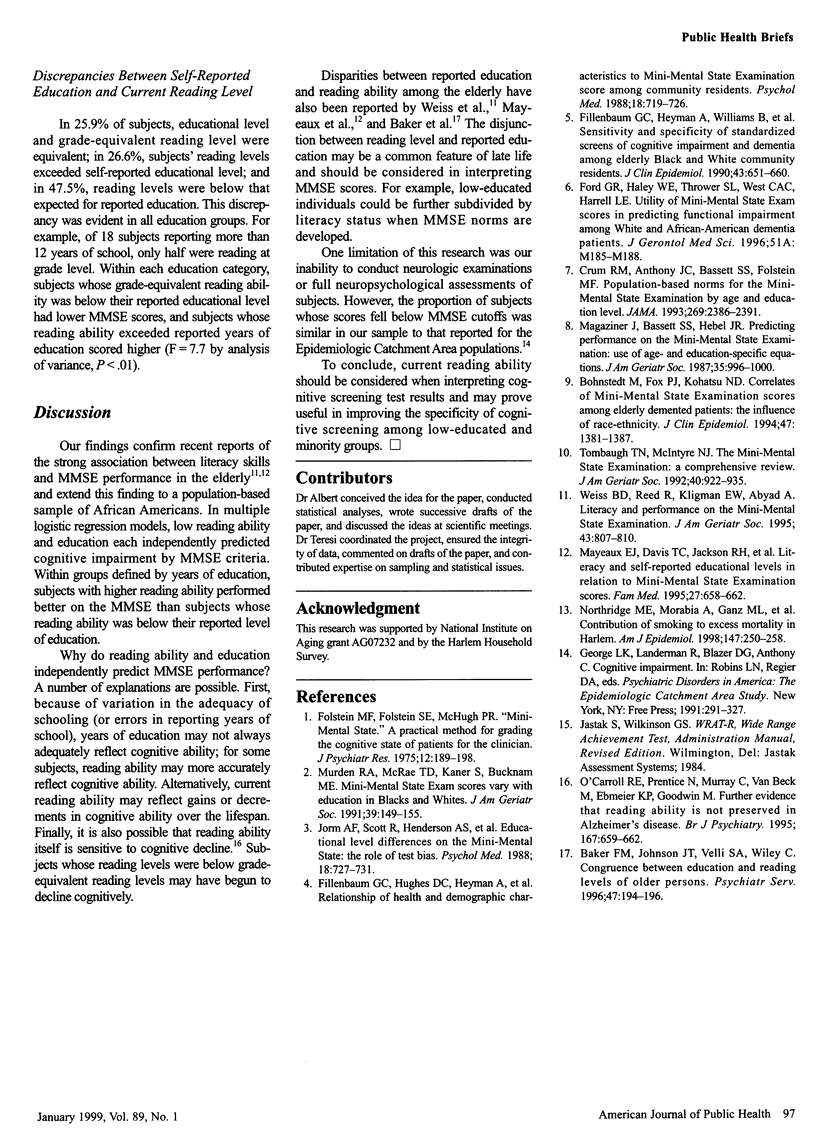Abstract
OBJECTIVES: This study examined reported level of education and current reading ability as predictors of cognitive status among older African Americans in central Harlem, New York City. METHODS: A probability sample of 164 noninstitutionalized older African Americans was assessed. Mini-Mental State Examination (MMSE) scores were regressed on education and reading ability measures. RESULTS: Reading ability and educational attainment were significant, independent predictors of MMSE performance. Within any level of education, subjects whose grade-equivalent reading ability exceeded reported level of education scored significantly higher on the MMSE. CONCLUSIONS: Reading ability may be useful in interpreting the results of cognitive screening among low-educated and minority groups.
Full text
PDF


Selected References
These references are in PubMed. This may not be the complete list of references from this article.
- Baker F. M., Johnson J. T., Velli S. A., Wiley C. Congruence between education and reading levels of older persons. Psychiatr Serv. 1996 Feb;47(2):194–196. doi: 10.1176/ps.47.2.194. [DOI] [PubMed] [Google Scholar]
- Bohnstedt M., Fox P. J., Kohatsu N. D. Correlates of Mini-Mental Status Examination scores among elderly demented patients: the influence of race-ethnicity. J Clin Epidemiol. 1994 Dec;47(12):1381–1387. doi: 10.1016/0895-4356(94)90082-5. [DOI] [PubMed] [Google Scholar]
- Crum R. M., Anthony J. C., Bassett S. S., Folstein M. F. Population-based norms for the Mini-Mental State Examination by age and educational level. JAMA. 1993 May 12;269(18):2386–2391. [PubMed] [Google Scholar]
- Fillenbaum G. G., Hughes D. C., Heyman A., George L. K., Blazer D. G. Relationship of health and demographic characteristics to Mini-Mental State examination score among community residents. Psychol Med. 1988 Aug;18(3):719–726. doi: 10.1017/s0033291700008412. [DOI] [PubMed] [Google Scholar]
- Fillenbaum G., Heyman A., Williams K., Prosnitz B., Burchett B. Sensitivity and specificity of standardized screens of cognitive impairment and dementia among elderly black and white community residents. J Clin Epidemiol. 1990;43(7):651–660. doi: 10.1016/0895-4356(90)90035-n. [DOI] [PubMed] [Google Scholar]
- Folstein M. F., Folstein S. E., McHugh P. R. "Mini-mental state". A practical method for grading the cognitive state of patients for the clinician. J Psychiatr Res. 1975 Nov;12(3):189–198. doi: 10.1016/0022-3956(75)90026-6. [DOI] [PubMed] [Google Scholar]
- Ford G. R., Haley W. E., Thrower S. L., West C. A., Harrell L. E. Utility of Mini-Mental State Exam scores in predicting functional impairment among white and African American dementia patients. J Gerontol A Biol Sci Med Sci. 1996 Jul;51(4):M185–M188. doi: 10.1093/gerona/51a.4.m185. [DOI] [PubMed] [Google Scholar]
- Jorm A. F., Scott R., Henderson A. S., Kay D. W. Educational level differences on the Mini-Mental State: the role of test bias. Psychol Med. 1988 Aug;18(3):727–731. doi: 10.1017/s0033291700008424. [DOI] [PubMed] [Google Scholar]
- Magaziner J., Bassett S. S., Hebel J. R. Predicting performance on the Mini-Mental State Examination. Use of age- and education-specific equations. J Am Geriatr Soc. 1987 Nov;35(11):996–1000. doi: 10.1111/j.1532-5415.1987.tb04002.x. [DOI] [PubMed] [Google Scholar]
- Mayeaux E. J., Jr, Davis T. C., Jackson R. H., Henry D., Patton P., Slay L., Sentell T. Literacy and self-reported educational levels in relation to Mini-mental State Examination scores. Fam Med. 1995 Nov-Dec;27(10):658–662. [PubMed] [Google Scholar]
- Murden R. A., McRae T. D., Kaner S., Bucknam M. E. Mini-Mental State exam scores vary with education in blacks and whites. J Am Geriatr Soc. 1991 Feb;39(2):149–155. doi: 10.1111/j.1532-5415.1991.tb01617.x. [DOI] [PubMed] [Google Scholar]
- Northridge M. E., Morabia A., Ganz M. L., Bassett M. T., Gemson D., Andrews H., McCord C. Contribution of smoking to excess mortality in Harlem. Am J Epidemiol. 1998 Feb 1;147(3):250–258. doi: 10.1093/oxfordjournals.aje.a009444. [DOI] [PubMed] [Google Scholar]
- O'Carroll R. E., Prentice N., Murray C., van Beck M., Ebmeier K. P., Goodwin G. M. Further evidence that reading ability is not preserved in Alzheimer's disease. Br J Psychiatry. 1995 Nov;167(5):659–662. doi: 10.1192/bjp.167.5.659. [DOI] [PubMed] [Google Scholar]
- Tombaugh T. N., McIntyre N. J. The mini-mental state examination: a comprehensive review. J Am Geriatr Soc. 1992 Sep;40(9):922–935. doi: 10.1111/j.1532-5415.1992.tb01992.x. [DOI] [PubMed] [Google Scholar]
- Weiss B. D., Reed R., Kligman E. W., Abyad A. Literacy and performance on the Mini-Mental State Examination. J Am Geriatr Soc. 1995 Jul;43(7):807–810. doi: 10.1111/j.1532-5415.1995.tb07057.x. [DOI] [PubMed] [Google Scholar]


